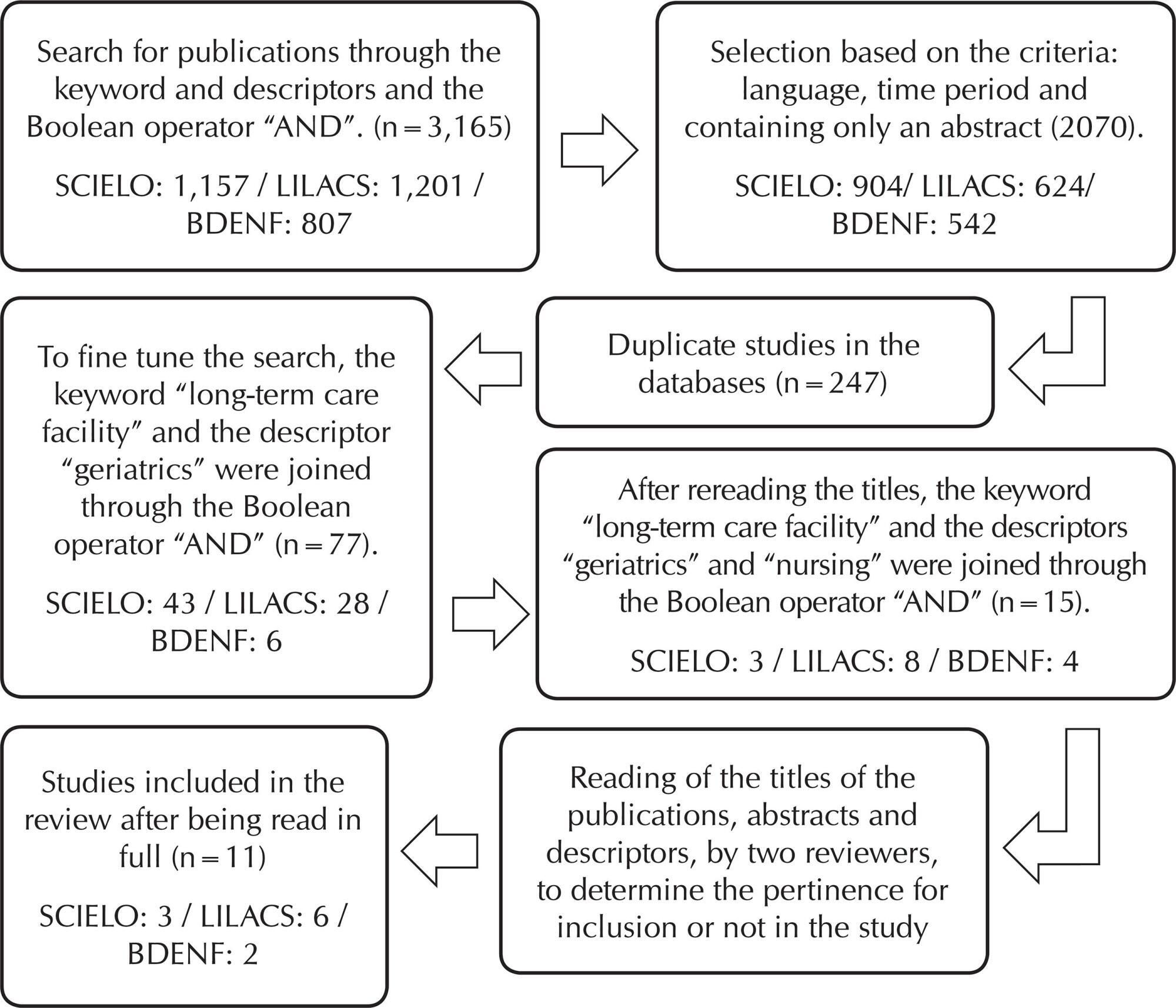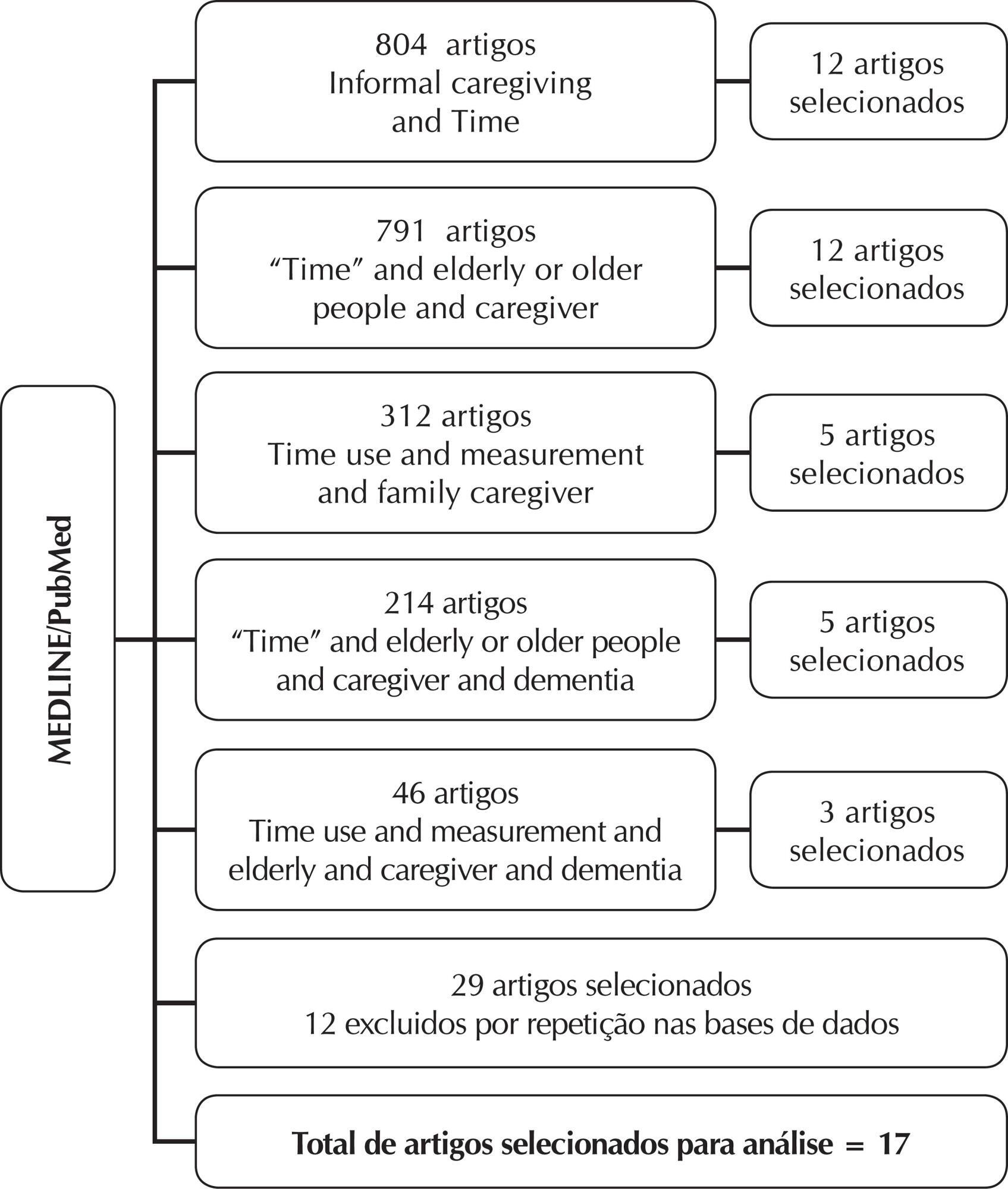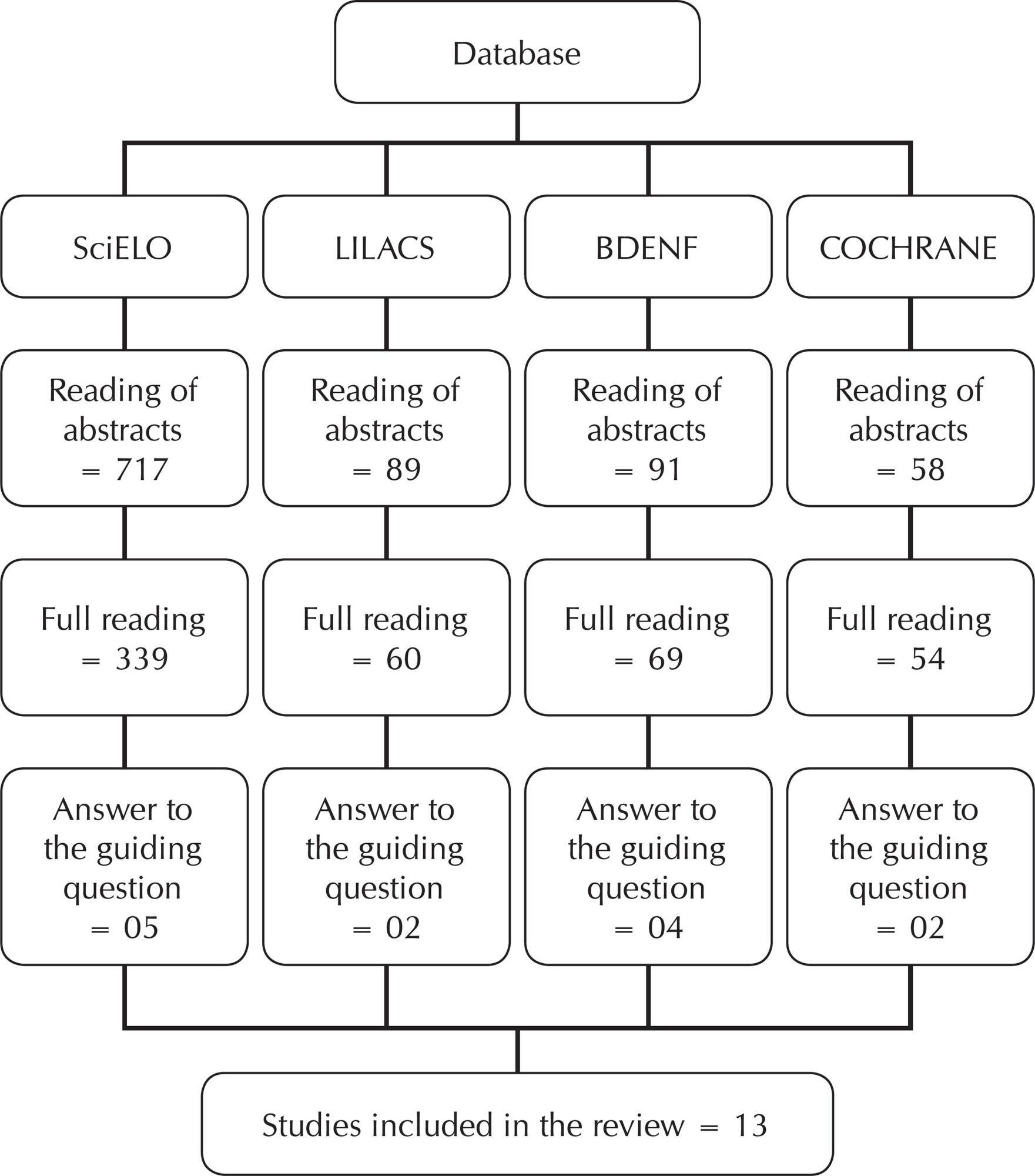-
EXPERIENCE REPORT01-01-2018
Conversation map: an educational strategy in the care of elderly people with diabetes mellitus
Revista Brasileira de Enfermagem. 2018;71:925-929
Abstract
EXPERIENCE REPORTConversation map: an educational strategy in the care of elderly people with diabetes mellitus
Revista Brasileira de Enfermagem. 2018;71:925-929
DOI 10.1590/0034-7167-2017-0064
Views0See moreABSTRACT
Objective:
To report the experience of using diabetes conversation maps as an educational strategy for diabetic elderly people.
Method:
Experience report, conducted from July to December 2016 in a specialized outpatient clinic for diabetics, in Fortaleza, Ceará, Brazil. A total of 72 users participated, between diabetics and those accompanying them.
Results:
The participants talked about issues that were not addressed in personal consultations, and could see themselves through the stories of others, thus realizing they were not alone and that others also experienced the same difficulties as them. Through empathy and the accounts of others, participants built knowledge and practices for their own daily lives.
Final Considerations:
The conversation map enables professionals to empower patients with diabetes, promoting self-care and ensuring better control over the disease, in order to prevent or delay the onset of related complications.
-
EXPERIENCE REPORT01-01-2018
Active methodologies for graduation in nursing: focus on the health care of older adults
Revista Brasileira de Enfermagem. 2018;71:920-924
Abstract
EXPERIENCE REPORTActive methodologies for graduation in nursing: focus on the health care of older adults
Revista Brasileira de Enfermagem. 2018;71:920-924
DOI 10.1590/0034-7167-2017-0150
Views0See moreABSTRACT
Objective:
To describe the experience of the use of simulation as active teaching methodology in the Developmental Psychology discipline and share its impacts on the students’ learning process.
Method:
Based on Active Methodologies, the students in Nursing of Universidade do Oeste Paulista – Presidente Prudente-SP developed simulated visits to older users of the Family Health Strategies.
Results:
In accordance with the 2014 National Curriculum Guidelines and the Brazilian Unified Health System, particularities of the needs of older adults at their homes were problematized.
Final considerations:
Addressing the biopsychosocial needs and integrality associated with the health of older adults in simulated home visits provides a differentiated instrument in the development of skills and competence of future nurses.
-
REVIEW01-01-2018
Gerontological contributions to the care of elderly people in long-term care facilities
Revista Brasileira de Enfermagem. 2018;71:912-919
Abstract
REVIEWGerontological contributions to the care of elderly people in long-term care facilities
Revista Brasileira de Enfermagem. 2018;71:912-919
DOI 10.1590/0034-7167-2017-0357
Views0See moreABSTRACT
Objective:
To analyze Brazilian scientific productions from the last 11 years which show the contributions of nursing to elderly people in long-term care facilities.
Method:
This is an integrative literature review. The search took place in the Virtual Health Library (VHL) in the BDENF and LILACS databases and the SCIELO virtual library, between June and October 2016, using the keyword long-term care facility and the descriptors nursing and geriatrics.
Results:
Eleven studies were selected, published 2005 and 2016, with various methodological approaches that enabled discussion of the proposed objective.
Conclusion:
The contributions of nursing to institutionalized elderly people were linked to health promotion measures, as well as simple interventions, such as listening, interacting, offering recreation and helping in psychoaffective relationships. These activities contributed to raising the self-esteem of the individuals.

-
REVIEW01-01-2018
Temporal analysis of the functional status of older people in the state of Paraíba, Brazil
Revista Brasileira de Enfermagem. 2018;71:905-911
Abstract
REVIEWTemporal analysis of the functional status of older people in the state of Paraíba, Brazil
Revista Brasileira de Enfermagem. 2018;71:905-911
DOI 10.1590/0034-7167-2017-0130
Views0See moreABSTRACT
Objective:
To verify the profile and the functional status of older people living in the state of Paraíba, Brazil, from a temporal perspective.
Method:
This was a descriptive study with secondary analysis of data from the Health Indicator and Aging Policy Monitoring system (SISAP-Idoso – Sistema de Indicadores de Saúde e Acompanhamento de Políticas do Idoso) between 2000 and 2010.
Results:
Over the analyzed period, there was a growth of older women, people older than 85 years, residents of urban areas, older people who live alone and who are not responsible for the household. There was also a decrease of illiterate older people, with monthly income of up to one minimum wage and in poverty situations. Concerning the functional status, the proportion of older people who reported any permanent mental, motor, visual or hearing disabilities has increased.
Conclusion:
We suggest that the assistance must be directed towards environmental variables that can influence the functional state, such as illiteracy, low income and disabilities that contribute to the weakening of older people and must be overcome.
-
REVIEW01-01-2018
Time use by family caregivers of elderly with dementia: an integrative review
Revista Brasileira de Enfermagem. 2018;71:893-904
Abstract
REVIEWTime use by family caregivers of elderly with dementia: an integrative review
Revista Brasileira de Enfermagem. 2018;71:893-904
DOI 10.1590/0034-7167-2017-0268
Views0See moreABSTRACT
Objective:
To describe the development of measures used between 1993 and 2016 to evaluate time use by family caregivers of elderly with dementia and to find out the patterns of time use identified in the literature.
Method:
An integrative review of articles was performed, indexed by the following terms: time use management, family caregiver and elderly.
Results:
A total of 17 articles were found, of which seven were methodological. Among these seven articles, five were psychometric. The most frequently used measures were self-reporting (matrices, questionnaires and inventories), validated through objective measures of occurrence and duration. Longitudinal, prospective, clinical and correlational studies showed that care time covaries with the receptors’ dependence and that the caregivers’ subjective well-being is more affected by the time restriction to free choice activities than the burden resulting from obligatory activities.
Final considerations:
Valid self-reporting measures are widely used nowadays and they are considered to be effective to assess the objective and subjective costs of health care for dementia.

-
REVIEW01-01-2018
Integrative review of literature: nursing care to aged people with HIV
Revista Brasileira de Enfermagem. 2018;71:884-892
Abstract
REVIEWIntegrative review of literature: nursing care to aged people with HIV
Revista Brasileira de Enfermagem. 2018;71:884-892
DOI 10.1590/0034-7167-2017-0264
Views0See moreABSTRACT
Objective:
To identify evidences in scientific Brazilian literature on nursing care to aged people with HIV.
Method:
Integrative review of literature from databases: Latin American and Caribbean Literature on Health Sciences (LILACS), Scientific Eletronic Library Online (SciELO), Cochrane and the Nursing Database (BDENF). The applied inclusion criteria were publications that were fully available from 2001 to 2015 and answered to the guiding question of this study.
Results:
We included 13 studies; and the categories that allowed a better presentation of the scientific evidence on nursing care to aged people with HIV carrier were: Epidemiological profile, perceptions and experiences of aged people with HIV and nursing care to aged people with HIV.
Conclusion:
The studies address nursing care from a clinic that follows NANDA diagnoses of strong individualizing approach and low consideration of social aspects.

-
01-01-2018
Perfil do índice de massa corporal e fatores associados em idosos ativos
Revista Brasileira de Enfermagem. 2018;71:876-883
Abstract
Perfil do índice de massa corporal e fatores associados em idosos ativos
Revista Brasileira de Enfermagem. 2018;71:876-883
DOI 10.1590/0034-7167-2016-0683
Views0See moreRESUMEN
Objetivo:
Identificar el perfil del índice de masa corporal y factores asociados en adultos mayores activo. Es un tipo de análisis de la investigación con diseño transversal y un enfoque cuantitativo con una muestra de 105 personas de edad avanzada.
Método:
El instrumento de investigación consistió en: la evaluación cognitiva, datos sociodemográficos, condiciones de salud y la evaluación del rendimiento del motor. Los datos fueron analizados mediante el análisis descriptivo y regresión logística binaria.
Resultados:
La persona de edad avanzada que no tiene compañero tiene 7.753 veces más probabilidades de tener exceso de peso en comparación con el viejo. Tener un ingreso mayor que el salario mínimo es 6.014 veces más probabilidades de tener sobrepeso. No tiene problemas de salud asciende a 0.015 veces la probabilidad de tener sobrepeso. El rendimiento del motor no presenta saldo de la limitación es 6.785 veces más propensos a ser afectados por el exceso de peso.
-
ORIGINAL ARTICLE06-27-2019
Validation of a clinical simulation setting in the management of postpartum haemorrhage
Revista Brasileira de Enfermagem. 2019;72(3):624-631
Abstract
ORIGINAL ARTICLEValidation of a clinical simulation setting in the management of postpartum haemorrhage
Revista Brasileira de Enfermagem. 2019;72(3):624-631
DOI 10.1590/0034-7167-2018-0065
Views0See moreABSTRACT
Objective:
To construct and validate a clinical simulation setting for postpartum haemorrhage.
Method:
Quantitative research of methodological development, carried out from May to July of 2016 with 22 expert judges and 30 students. Analysis was performed from descriptive statistics, Binomial Test and Content Validity Index (CVI), considering CVI ≥ 80%.
Results:
Setting construction was based on learning objectives, fidelity, evaluation tool, pre-setting activities and debriefing. Agreement, regarding its validity, was satisfactory in the 23 items analyzed. Items evaluated by judges had CVI> 0.90; in the evaluation by students, CVI was > 0.95.
Conclusion:
It was considered validated and suitable for training and use by nursing students. Other studies should be carried out in order to test its effectiveness in the construction of theoretical and practical knowledge of both nursing students and nurses during Permanent Education.
-
REVIEW06-01-2020
Access of the black population to health services: integrative review
Revista Brasileira de Enfermagem. 2020;73(4):e20180834
Abstract
REVIEWAccess of the black population to health services: integrative review
Revista Brasileira de Enfermagem. 2020;73(4):e20180834
DOI 10.1590/0034-7167-2018-0834
Views1See moreABSTRACT
Objectives:
demonstrate and discuss how the black population’s access to health services occurs
Methods:
integrative literature review with the following question: How does the black population’s access to health services occur? The search was carried out in the Scholar, LILACS and SciELO databases and used the descriptor “access to health services” and the term “population,” resulting in a sample with twelve articles.
Results:
studies show that the difficulty of access is a fundamental factor for the quality of life of people, directly compromising preventive services, especially for women’s health and, in addition, it has significant impact on the illness process of the black population within its particularities.
Final Considerations:
several limiting factors compromise the black population’s access to health services, including institutional and structural factors

-
ORIGINAL ARTICLE10-21-2019
Occupational stress and engagement in primary health care workers
Revista Brasileira de Enfermagem. 2019;72(6):1580-1587
Abstract
ORIGINAL ARTICLEOccupational stress and engagement in primary health care workers
Revista Brasileira de Enfermagem. 2019;72(6):1580-1587
DOI 10.1590/0034-7167-2018-0681
Views0See moreABSTRACT
Objective:
To evaluate levels of occupational stress and work engagement among primary health care workers.
Method:
A descriptive, correlational and transversal study was carried out in a small municipality in the countryside of São Paulo, with a non-probabilistic sample of convenience, with 85 workers. Three self-applied instruments were used: one developed by researchers, containing sociodemographic variables; Work Stress Scale (WSS) and Utrech Work Engagement Scale (UWES).
Results:
Prevalence of women (72.6%), 40 years old or more (45.9%), 4 years and 4 months of mean working time in primary care. Thirty-one workers (36.5%) presented significant stress (scores ≥2.5). Work engagement showed a mean of 4.1 (±1.2) to 4.4 (±1.4), classified as high in all dimensions. Occupational stress and work engagement correlated negatively.
Conclusion:
Workers presented high levels of work engagement; more than one-third had significant occupational stress. Workers with high levels of occupational stress tend to have lower work engagement.
-
ORIGINAL ARTICLE07-01-2020
Patient safety culture: perception of nursing professionals in high complexity institutions
Revista Brasileira de Enfermagem. 2020;73(5):e20190174
Abstract
ORIGINAL ARTICLEPatient safety culture: perception of nursing professionals in high complexity institutions
Revista Brasileira de Enfermagem. 2020;73(5):e20190174
DOI 10.1590/0034-7167-2019-0174
Views1See moreABSTRACT
Objectives:
to analyze the perception of nursing professionals about patient safety culture in three highly complex hospital institutions.
Methods:
descriptive and quantitative study with professionals working in care. The Hospital Survey on Patient Safety Culture questionnaire was applied, classifying its dimensions according to the percentage of positive responses (strengthened: ≥75.0%; potential for improvement: <75.0% to> 50.0%; weakened: ≤50.0%).
Results:
four hundred sixty-seven professionals (79.6%), mostly women (88.4%), nursing technicians/assistants (57.2%), 20 to 39 years (60.8%), less than five years in the institution (57.8%) and exclusive bond (79.2%) participated in the study. Safety culture was considered fragile, seven dimensions assessed as such, highlighting “Openness to communication” and “Non-punitive responses to errors” with <30.0% positive responses.
Conclusions:
evidence of the need for discussion of the subject and strategies for change that promote quality and safety of care.

-
REVIEW11-06-2020
Transitional care to caregivers of dependent older people: an integrative literature review
Revista Brasileira de Enfermagem. 2020;73:e20200394
Abstract
REVIEWTransitional care to caregivers of dependent older people: an integrative literature review
Revista Brasileira de Enfermagem. 2020;73:e20200394
DOI 10.1590/0034-7167-2020-0394
Views1See moreABSTRACT
Objective:
To identify the needs of caregivers of dependent older people related to self-care in the transition from hospital to home.
Methods:
Integrative literature review that followed a predefined protocol, carried out from March to May 2019 in the platforms EBSCO, B-On, Scopus, Web of Science, and Joanna Briggs Institute. Descriptors and eligibility criteria were defined for the bibliographic sample, which was ten articles. The search was limited to articles published between 2015 and 2019 to guarantee evidence topicality.
Results:
The needs of caregivers related to transitional care can be grouped into five categories: needs in the transition into the role of caregiver; needs related to self-care of caregivers themselves; health needs; economic needs; and social and collective needs.
Final considerations:
The work developed by nurses regarding transitional care of caregivers must have two focuses: managing care provided to dependent older people and managing the needs of caregivers and the care offered to them.

-
ORIGINAL ARTICLE06-27-2019
Debriefing evaluation in nursing clinical simulation: a cross-sectional study
Revista Brasileira de Enfermagem. 2019;72(3):788-794
Abstract
ORIGINAL ARTICLEDebriefing evaluation in nursing clinical simulation: a cross-sectional study
Revista Brasileira de Enfermagem. 2019;72(3):788-794
DOI 10.1590/0034-7167-2018-0103
Views0See moreABSTRACT
Objective:
Evaluate the contribution of debriefing after clinical simulations for nursing students.
Method:
Quantitative study, conducted with 35 nursing students who participated in five clinical simulation scenarios with planned debriefings based on the model of the National League Nursing/Jeffries Simulation Theory. After the fifth scenario, students answered the Debriefing Evaluation Scale associated with the Simulation.
Results:
The items evaluated involved the psychosocial, cognitive, and affective values, and within a scale from one to five, the highest mean was found in cognitive value with 4.23 (±0.56) points, then in psychosocial value with 3.77 (±0.53), and finally in affective value with 3.71 (±0.63) points.
Conclusion:
The debriefing conducted after the clinical simulation scenarios was a reflective exercise that contributed to the student integrating multiple knowledges in affective, cognitive and psychosocial values, and thus develop the competencies required.
-
REVIEW10-19-2020
Validation methods of nursing protocols: an integrative review
Revista Brasileira de Enfermagem. 2020;73:e20200050
Abstract
REVIEWValidation methods of nursing protocols: an integrative review
Revista Brasileira de Enfermagem. 2020;73:e20200050
DOI 10.1590/0034-7167-2020-0050
Views0See moreABSTRACT
Objective:
to identify scientific production about validation methods of nursing care protocols.
Method:
an integrative review with search at Scielo, Pubmed/MEDLINE, Virtual Health Library, Web of Science, Scopus, and EBSCOhost. The descriptors “validation studies”, “validation studies as topic”, “protocols”, “clinical protocols”, “practice guidelines as topic”, “nursing” and “nursing assessment” and the uncontrolled descriptor “validation” were used.
Results:
thirty-two articles were selected, most of them Brazilian. Content validation by experts was the most frequent method, with no consensus on the number of participants for the process. The collection instruments were mostly created by the authors. Data analysis was performed using descriptive statistics and Content Validity Index, with a variable consensus rate in the analyzed articles.
Conclusion:
protocols validated by experts are robust tools for use in clinical practice, with methodological rigor in development essential for its quality.

-
EXPERIENCE REPORT04-09-2020
Implementation of an Artificial Intelligence Algorithm for sepsis detection
Revista Brasileira de Enfermagem. 2020;73(3):e20180421
Abstract
EXPERIENCE REPORTImplementation of an Artificial Intelligence Algorithm for sepsis detection
Revista Brasileira de Enfermagem. 2020;73(3):e20180421
DOI 10.1590/0034-7167-2018-0421
Views0See moreABSTRACT
Objectives:
to present the nurses’ experience with technological tools to support the early identification of sepsis.
Methods:
experience report before and after the implementation of artificial intelligence algorithms in the clinical practice of a philanthropic hospital, in the first half of 2018.
Results:
describe the motivation for the creation and use of the algorithm; the role of the nurse in the development and implementation of this technology and its effects on the nursing work process.
Final Considerations:
technological innovations need to contribute to the improvement of professional practices in health. Thus, nurses must recognize their role in all stages of this process, in order to guarantee safe, effective and patient-centered care. In the case presented, the participation of the nurses in the technology incorporation process enables a rapid decision-making in the early identification of sepsis.
Search
Search in:
Nuvem de Tags
Adolescente (85) Atenção Primária à Saúde (239) COVID-19 (91) Criança (91) Cuidados de Enfermagem (269) Educação em Enfermagem (151) Educação em Saúde (139) Enfermagem (930) Enfermagem Pediátrica (86) Estudantes de Enfermagem (77) Estudos de Validação (131) Família (87) Idoso (208) Promoção da Saúde (99) Qualidade de Vida (104) Saúde do Trabalhador (86) Saúde Mental (145) Saúde Pública (82) Segurança do Paciente (150) Tecnologia Educacional (100)



